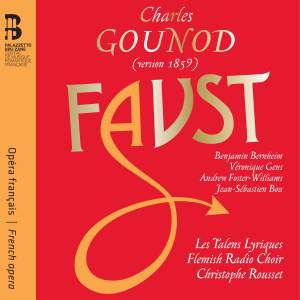 Charles Gounod: Faust (Fassung von 1859); Benjamin Bernheim (Faust), Véronique Gens (Marguerite), Andrew Foster-Williams (Méphistophélès), Jean-Sébastien Bou (Valentin), Juliette Mars (Siebel), Ingrid Perruche (Marthe), Anas Séguin (Wagner/Un mendiant), Flemish Radio Choir, Les Talens Lyriques, Christophe Rousset; 2 CDs Bru Zane BZ10372; Aufnahme, Veröffentlichung 30/08/2019 (113') – Rezension von Remy Franck
Charles Gounod: Faust (Fassung von 1859); Benjamin Bernheim (Faust), Véronique Gens (Marguerite), Andrew Foster-Williams (Méphistophélès), Jean-Sébastien Bou (Valentin), Juliette Mars (Siebel), Ingrid Perruche (Marthe), Anas Séguin (Wagner/Un mendiant), Flemish Radio Choir, Les Talens Lyriques, Christophe Rousset; 2 CDs Bru Zane BZ10372; Aufnahme, Veröffentlichung 30/08/2019 (113') – Rezension von Remy Franck

Die Überraschung dieser Faust-Einspielung ist der Sänger der Titelrolle, der französische Tenor Benjamin Bernheim. Ich hatte mir wirklich keinen so guten Faust erwartet! Bernheim hatte ich zwar schon in Nebenrollen gehört, und er hatte mir darin auch immer imponiert, aber sein Faust hat Klasse. Das Timbre ist angenehm, trotz einiger nicht so schöner Einfärbungen in der ohnehin etwas schmalen Mittellage und auch wenn die Stimme etwas mehr Wärme haben könnte. Aber mit dem, was da ist, vollbringt Bernheim eine sehr gute Leistung. Die gepflegte Vokallinie, die Noblesse der Phrasierung, die sichere Atemführung, eine gute Projektion und die Kontrolle der Stimme (ein ausgezeichnetes Management der Mischstimme und der Kopfstimme) sind Vorzüge, die dem Sänger auch gute Gestaltungsmöglichkeiten erlauben.
Für die zweite wichtige Rolle, die des Mephistos, wurde der britische Bassbariton Andrew Foster-Williams engagiert. Er hat nicht die Stimme des tiefen dunklen Basses, die man in der Vergangenheit so bewunderte (Ghiaurov, Ramey, Christoff), aber er kann mit seiner Charakterisierungskunst der Rolle doch Profil geben.
Und dann ist da noch Véronique Gens als Marguerite. So jung Faust und Mephisto hier sind und wirken, so reif klingt die Gens. Nicht dass sie nicht gut sänge, ganz im Gegenteil, aber für mein Empfinden passt sie stimmlich nicht besonders gut zu diesem Faust.
Die übrigen Rollen sind alle sehr gut besetzt und ihnen kommt in dieser Fassung von 1859 eine größere Bedeutung zu als in der heute meistens gespielten Fassung von 1869, für die Gounod vieles gestrichen hat, vor allem die gesprochenen Dialoge aber auch Musik (so etwa die Mephisto-Arie Maître Scarabée, die durch die weitaus attraktivere Arie Le Veau d’or ersetzt wurde, die hier natürlich nicht zu hören ist.) Zu den Verschiedenheiten der beiden Fassungen gibt es im Textbuch einen längeren, sehr detaillierten Artikel von Alexandre Dratwicki. Der Umstand, dass die langen Dialoge – oft in Form von Melodramen – in dieser Einspielung vorhanden sind, ist nicht nur von Vorteil, da die Sänger allzu oft als Sprecher etwas fantasielos agieren.
Zur dennoch generell guten Qualität dieser Aufführung trägt auch der Flämische Radiochor bei.
Christophe Rousset wählt oft relativ schnelle Tempi und gibt der Musik eine angenehme Leichtigkeit. Während der Lyrismus der Musik gut zum Ausdruck kommt, wären im Orchester Les Talens Lyriques etwas mehr Spontaneität, Dynamik und dramatisches Pulsieren vorteilhaft gewesen. Das Orchester wurde zudem von der Aufnahmetechnik ziemlich im Hintergrund angesiedelt und klingt eher matt und dumpf. Das ist natürlich für die Sänger günstig.
Als Erstaufnahme der historischen Fassung von 1859 gebührt der neuen Aufnahme großes Interesse, und es ist wirklich spannend zu untersuchen, was Gounod zwischen dieser und der zweiten Fassung alles verändert hat.
The surprise of this Faust recording is the singer of the title role, French tenor Benjamin Bernheim. I really didn’t expect such a good Faust! I had already heard Bernheim in smaller roles and he had always impressed me, but his Faust is really classy. The timbre is pleasant, despite some not so nice colorations in the anyway somewhat narrow middle range and even if the voice could have a little more warmth. But the smooth vocal line, the noblesse of his phrasing, the breathing, a good projection and the control of the voice are advantages allowing the singer good possibilities for the characterization of his part.
In the second important role, Mephisto, British bass-baritone Andrew Foster-Williams doesn’t have the deep dark bass voice so admired in the past (Ghiaurov, Ramey, Christoff), but with his art of characterisation he can give the role a notable profile. And then there is Véronique Gens as Marguerite. While Faust and Mephisto are really young in this performance, Gens sounds too mature. Not that she doesn’t sing well, quite the contrary, but in my opinion she doesn’t fit in this cast.
The other roles are all very satisfying, and in this version of 1859 they have a greater importance than in the normally played version from 1869, for which Gounod has deleted a lot, especially the spoken dialogues but also music (such as the Mephisto-Arie Maître Scarabée, which was replaced by the much more attractive aria Le Veau d’or, which, of course, cannot be heard here.) The textbook contains a longer, very detailed article by Alexandre Dratwicki on the differences between the two versions. The fact that the long dialogues – often in the form of melodramas – are present in this recording is not only an advantage, as the singers all too often are somewhat unimaginative as speakers.
The Flemish Radio Choir contributes to the generally good quality of this performance. Christophe Rousset often chooses relatively fast tempos and gives the music a pleasant lightness. While the lyricism of the music is well expressed, more spontaneity, dynamics and dramatic pulsation would have been advantageous in the orchestral playing. Moreover, due to the recording technique, Les Talens Lyriques sounds compact and dull from the background. This is of course good for the singers. Despite some deficiencies, this first recording of the historical version of 1859 deserves great interest, and it is really exciting to examine what Gounod changed between this one and the second version of his Faust.


















